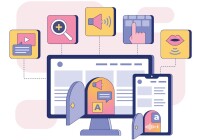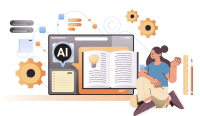Search
There are 23 results.
Category
Tag
Tag
All (23)
Activities (1)
Alt Text (1)
Assessments (4)
Belonging (1)
Canvas (1)
Collaboration (1)
Color Contrast (1)
Content Creation (11)
Course Materials (7)
Course Preparation (3)
Diversity (2)
Equity (1)
Faculty Support (1)
Formative Assessments (1)
Generative AI (4)
Images (1)
Inclusion (2)
Page Design (1)
PowerPoint (1)
Representation (1)
Rubrics (1)
Screen Readers (1)
Summative Assessments (1)
Video (1)
Visual Accessibility (2)
Spreadsheet Accessibility
Spreadsheets are used for a broad array of data-related tasks and projects across numerous disciplines. Maximizing the utility of spreadsheets as course materials requires careful attention towards their content and formatting. In this piece, we present recommendations for enhancing the clarity, consistency, and accessibility of course spreadsheets for students.
Hyperlink Dos and Don'ts
When designing a course, you want to ensure that all students can access the websites and documents that you link. Accessible hyperlinks are particularly important for students with screen readers, which read the links out loud. This piece contains best practices for writing and formatting accessible hyperlinks so that all learners can access the content that you have curated for your course.
Accessible Use of Text
Students with diverse cognitive, linguistic, and academic abilities benefit from accessible text. The Web Content Accessibility Guidelines (WCAG) establish numerous requirements (known as success criteria) to ensure that text is perceivable, operable, and understandable to all users. This guide discusses the essential criteria related to text accessibility. Following these guidelines when creating course content, such as documents, slides, and pages in a learning management system (LMS), will help you eliminate potential barriers for your learners.
Accessibility Considerations for Students With Motor Disabilities
Online courses can offer numerous advantages to students. In order for all students to benefit from these advantages, it is essential to prioritize accessibility needs in all aspects of course design and delivery. This piece focuses on considerations and recommendations for enhancing the accessibility of online courses for students with motor impairments.
Don't Leave Your Learners Behind: Start Tackling Web Accessibility Now!
If you’re an educator, you're probably familiar with the concept of accessibility, which often manifests in the classroom in the form of accommodation requests to meet specific students' needs. If you're an online educator, you've hopefully heard about web accessibility, which requires adhering to specific guidelines when designing and providing materials via the web, reducing the need for student accommodations by anticipating and removing potential barriers to learning.
Developing AI Literacy Across the Curriculum: A Guide for Programs and Faculty
The rapid integration of AI into professional practice across disciplines makes AI literacy increasingly crucial, not just for technology-focused fields but for all areas of study. Even faculty who are skeptical of AI's value need to consider how it's transforming their disciplines. For example, scientific fields are seeing AI adoption in literature reviews, experimental design, and data analysis. In the humanities, AI tools are already being used for textual analysis, translation, and content creation. Creative disciplines must grapple with AI's impact on artistic production and copyright. Professional programs face increasing pressure from employers who expect graduates to understand AI applications in their field.
Integrating AI Into Assessments: From Policy to Practice
Conventional assessments, such as essays and multiple-choice questions, have long been the cornerstone of evaluating student performance. However, the widespread availability of generative AI (genAI) tools necessitates rethinking assessment methods. Now that genAI tools are readily accessible and rapidly improving, it is crucial to develop assessment approaches that maintain academic integrity while leveraging the benefits of AI to engage students and prepare them for the modern workforce (Yu, 2023).
Fostering Deep Learning and Motivation in the AI Era
As generative artificial intelligence (genAI) reshapes the educational landscape, faculty must rethink traditional assessment strategies to maintain academic integrity and real-world relevance. This piece explores strategies for creating effective assessments in an AI-mediated world, focusing on two key areas: collaborative activities that develop essential human skills, and formative assessments that emphasize personal growth and deep learning. These approaches not only address concerns about AI misuse but also prepare students for future workplaces where human capabilities will complement AI tools.










